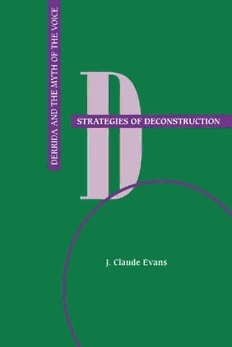Download Strategies of Deconstruction: Derrida and the Myth of the Voice PDF Free - Full Version
Download Strategies of Deconstruction: Derrida and the Myth of the Voice by J. Claude Evans in PDF format completely FREE. No registration required, no payment needed. Get instant access to this valuable resource on PDFdrive.to!
About Strategies of Deconstruction: Derrida and the Myth of the Voice
Strategies of Deconstruction was first published in 1991. Minnesota Archive Editions uses digital technology to make long-unavailable books once again accessible, and are published unaltered from the original University of Minnesota Press editions.In the past two decades, the "movement" of deconstruction has bad tremendous impact on a number of academic, disciplines in the United States. However, its force has been rather limited in the field of philosophy, despite the fact that in Europe the practice of deconstruction emerged in the work of philosophers. Although the reasons for this can be debated, two of the more obvious explanations are the mainstream Anglo-American philosophers rarely studied the German and French philosophical traditions in great detail, and deconstruction's focus on discourse and interpretation has made it more attractive to the literary and humanistic disciplines. With this context, Strategies of Deconstruction focuses on the early work of Jacques Derrida, the French philosopher who introduced deconstruction in Speech and Phenomena,his study of Edmund Husserl, and Of Grammatology, and whose philosophical reputation stems in no small part from his work on Husserl. In examining the philosophical import of Derrida's theories of reading, text, and language, specifically as they related to Speech and Phenomena,J. Claude Evans makes careful reference to Husserl's own texts. His analysis indicates that there are many systematic irregularities in Derrida's study and that without those irregularities Derrida's conclusions cannot be substantiated.
Detailed Information
| Author: | J. Claude Evans |
|---|---|
| Publication Year: | 1991 |
| ISBN: | 9780816619269 |
| Pages: | 232 |
| Language: | English |
| File Size: | 12.237 |
| Format: | |
| Price: | FREE |
Safe & Secure Download - No registration required
Why Choose PDFdrive for Your Free Strategies of Deconstruction: Derrida and the Myth of the Voice Download?
- 100% Free: No hidden fees or subscriptions required for one book every day.
- No Registration: Immediate access is available without creating accounts for one book every day.
- Safe and Secure: Clean downloads without malware or viruses
- Multiple Formats: PDF, MOBI, Mpub,... optimized for all devices
- Educational Resource: Supporting knowledge sharing and learning
Frequently Asked Questions
Is it really free to download Strategies of Deconstruction: Derrida and the Myth of the Voice PDF?
Yes, on https://PDFdrive.to you can download Strategies of Deconstruction: Derrida and the Myth of the Voice by J. Claude Evans completely free. We don't require any payment, subscription, or registration to access this PDF file. For 3 books every day.
How can I read Strategies of Deconstruction: Derrida and the Myth of the Voice on my mobile device?
After downloading Strategies of Deconstruction: Derrida and the Myth of the Voice PDF, you can open it with any PDF reader app on your phone or tablet. We recommend using Adobe Acrobat Reader, Apple Books, or Google Play Books for the best reading experience.
Is this the full version of Strategies of Deconstruction: Derrida and the Myth of the Voice?
Yes, this is the complete PDF version of Strategies of Deconstruction: Derrida and the Myth of the Voice by J. Claude Evans. You will be able to read the entire content as in the printed version without missing any pages.
Is it legal to download Strategies of Deconstruction: Derrida and the Myth of the Voice PDF for free?
https://PDFdrive.to provides links to free educational resources available online. We do not store any files on our servers. Please be aware of copyright laws in your country before downloading.
The materials shared are intended for research, educational, and personal use in accordance with fair use principles.

